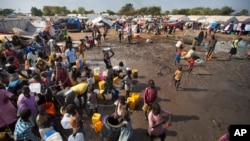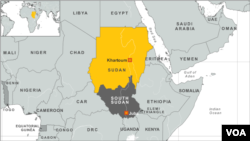The world's youngest nation returned to war earlier this year, after only three years of independence and relative peace. And the prospects for an end to fighting are dim.
Residents and analysts in Juba said they are not optimistic and see more strife as plans to build South Sudan appear to evaporate.
Akuja de Garang is one of many South Sudanese who returned to make a positive contribution to the growth of the country.
Publicly, Garang is best known for organizing an annual fashion show that presents local designs and artists. The idea behind the show, now in its third year, is to overcome ethnic tensions that have fueled South Sudan’s ongoing conflict.
“Our differences don’t need to create conflict and we can kind of celebrate each other's cultures and try to learn a bit more," Garang said.
While the conflict has had no sizable impact on this year’s event - in fact, the fashion show expanded - the fighting has affected Garang.
Looking at alternatives
Six months ago, she was not considering leaving South Sudan. But after a number of peace deals were violated and sanctions proved ineffective, Garang said she and her husband are now working on an alternate plan in case things go terribly wrong.
“What do we do if things go wrong, because otherwise it would be naïve if we don’t. So we talk about this and then we get too depressed by the whole thing, about being uprooted again because we all have been through this," she said.
Nhial Bol is editor-in-chief of The Citizen, a leading daily that also owns a TV channel, which is the only alternative to state TV.
Bol said the conflict has made balanced reporting impossible because South Sudan’s Ministry of Information has prohibited all local media from presenting the rebels’ point of view.
Bol, who has been arrested for his work several times in the past few years, recently built a hotel-restaurant next to his newsroom. He said its purpose is not to simply generate more money.
“Well, this is just, the idea is that we have to plan a project for survival. ... If the government closes the newspaper or the television, we don’t want to lose the brain of the people whom we have trained. So we will try to meet the salaries from the restaurant work," Bol said.
Majority are frustrated
South Sudan’s citizens are frustrated. The large majority are doubtful that the yearlong conflict will end soon.
Residents are angry at political leaders who have plunged the war-torn country into renewed fighting only three years after an ndependence that many had hoped would mark the beginning of a better future.
One of the few who expressed some optimism was Lual Deng, a former oil minister who is now the director of an independent think tank, the Ebony Center.
Recently, three political factions of the SPLM ruling party had met in Tanzania. Deng saw this as a positive development in addition to the ongoing peace talks in Ethiopia. Still, he had reservations.
“So this is what makes me hopeful. But also I’m nervous at the same time because the dry season is coming. The first anniversary of the conflict is approaching and both parties are preparing for any conflict should there be a failure in either Arusha or Addis Ababa," Deng said.
Four peace agreements and a number of sanctions by the United States and the European Union have brought no halt to the fighting.
The conflict has killed tens of thousands of people and displaced more than 1.5 million.





